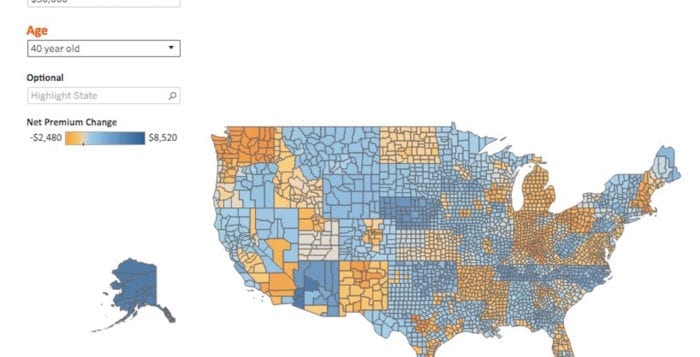Changes in federal health care law will impact North Shore residents

Republicans in Congress have vowed to repeal and replace the Affordable Care Act, commonly referred to as Obamacare, since its inception in 2010, and after much adieu, a bill has finally been introduced to take its place.
The American Health Care Act has been met with opposition from both parties, while elected officials and hospital administrators weighed in on what the changes might mean for North Shore residents.
The most notable changes in the new health care plan compared to the existing one include an elimination of the individual mandate, which required all Americans to purchase health insurance or be subject to a fine — a sticking point for many Republicans on Obamacare; a cut of federal Medicaid funding for Planned Parenthood for one year; adjusting tax credits based on age instead of income; and shifting Medicaid expansion set forth by Obamacare to the discretion of states instead of the federal government, among many others.
The Kaiser Family Foundation, a nonprofit organization established to deliver health policy analysis to the public, has created an interactive map on its website to illustrate the estimated changes in premiums paid and tax credits for several demographics from the ACA to the AHCA.
“This is bad news for New York. … We cannot support this legislation in its current form.”
—Kevin Dahill
Tax credits, or the amount a taxpayer can offset what is owed in federal income tax, are a component of both the current health care law and the proposed replacement, though their implementation is very different.
According to the map estimates, a 27-year-old living in Suffolk County making $30,000 per year would receive about 50 percent less in tax credits in 2020 if the new bill became law. A 27-year-old making $40,000 per year would see the tax credit slashed by only 14 percent, but a $10,000 raise would net that same 27-year-old an approximate additional 52 percent in tax credits under the AHCA compared to the ACA.
A 40-year-old Suffolk County resident making $30,000 annually would receive 24 percent less in tax credits, while a 40-year-old making $50,000 would see a 128 percent boost in tax credits. Additionally, a 40-year-old making $75,000 annually would receive $3,000 in tax credits — under Obamacare no tax credits would be received.
Similarly, a Suffolk County resident who is aged at least 60 and earns $75,000 per year would receive a $4,000 tax credit under the proposed bill, despite being ineligible for a tax credit under Obamacare. A 60-year-old making $30,000 annually would receive a 2 percent increase in tax credits.
U.S. Rep. Lee Zeldin (R-Shirley), who has said in the past he would like to maintain certain aspects of Obamacare, like allowing people aged 26 or younger to remain on their parents’ health plans and coverage for people with preexisting conditions, weighed in on the Republican plan in an emailed statement through spokeswoman Jennifer DiSiena.
DiSiena reiterated Zeldin’s stance on kids remaining on parents plans and coverage for individuals with preexisting conditions, though she added he believes a smooth transition from the ACA to the new plan is the most important thing.
“Obamacare has resulted in higher premiums, higher deductibles, lost doctors and canceled policies, among many other challenges,” she said. “Deductibles are so high, many people now feel like they don’t even have insurance anymore. One-third of the counties in our country only have one option left under the exchange. That’s not choice. That’s a monopoly.”
“Deductibles are so high, many people now feel like they don’t even have insurance anymore. One-third of the counties in our country only have one option left under the exchange.”
—Lee Zeldin
DiSiena also sought to dispel what she called misconceptions being perpetuated about the new bill and what the policy might do to people’s coverage. She said no one will be kicked off Medicaid under the new bill, premiums might rise in the short term but are expected to be 10 percent lower by 2026 than their current levels, and the claim by the Congressional Budget Office that 24 million Americans covered under Obamacare would lose coverage can be attributed to people who were forced to purchase health care opting to go without.
DiSiena added Zeldin is generally supportive of the bill as written but intends to monitor proposed amendments.
U.S. Rep. Tom Suozzi (D-Glen Cove) was far less supportive during an interview on MSNBC’s “Morning Joe” March 14.
“We have to continue to point out that 24 million people are going to be kicked off, that their premiums are going to go up, that there’s a transfer of cutting taxes on the wealthiest Americans, and raising premiums on senior citizens and others,” he said in the interview. “This is really a life and death thing.”
Suozzi’s office did not respond to a request for comment.
Kevin Dahill, president and CEO of Suburban Hospital Alliance, an organization that represents the advocacy interests of Long Island health systems including St. Catherine of Siena in Smithtown and St. Charles Hospital in Port Jefferson, issued a statement regarding the House bill March 13.
“The House bill neither truly repeals nor meaningfully replaces the Affordable Care Act,” Dahill said. “This is bad news for New York. … We cannot support this legislation in its current form.”
Chief Medical Officer at Huntington Hospital Michael Grosso said in an email his facility will continue to hold itself to the highest standards regardless of the federal health care law.
“That said, we must bear in mind as an informed citizenry that when effective, preventive health care is delayed or denied, society pays the price several times over,” Grosso said.
The House of Representatives is scheduled to vote on the bill today, March 23. House Republicans introduced several amendments to the original legislation earlier this week.






